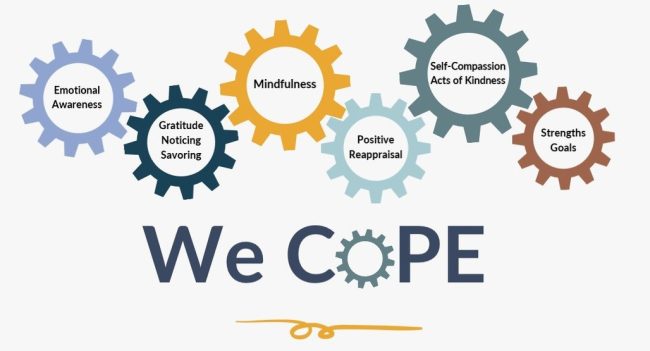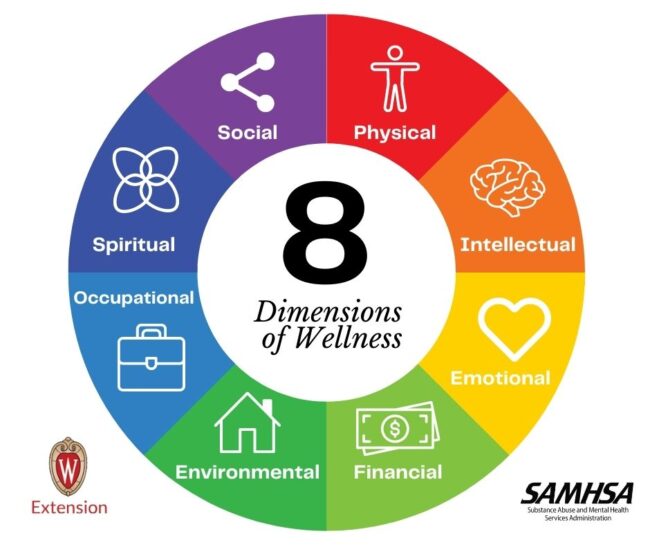Mental & Emotional Health

WeCOPE
WeCOPE is an evidence-based program that helps adults cope with life stress. This course is based on the positive emotions research of Dr. Judith Moskowitz which has shown that connecting with positive emotions reduces stress and depression, increases positive feelings, and improves healthy habits.
The program runs for six to seven weeks, with one-hour sessions each week. During these sessions, participants learn and practice 11 self-care and coping skills such as gratitude, self-compassion, everyday mindfulness strategies, labeling feelings, acts of kindness, goal setting and more. These skills help participants manage stress with healthy strategies and bring more positive emotions into their daily lives to reduce the impact of their stressors.
If you are interested in bringing this program to your organization, church group or workplace, please contact Danielle Sander (608-355-3256 or danielle.sander@wisc.edu)

COMET
COMET™ is a two-hour program offered by UW – Madison Division of Extension educators for the agricultural and rural communities in Wisconsin. The program can be offered in-person as a standalone workshop, attached to a larger conference, or on a virtual platform. The maximum number of participants for any of these formats is 30. The program is a gentle introduction to supporting friends and neighbors in a vulnerable space to help them shift their mental health trajectory back to a place of wellness and away from the path of a mental health crisis. This program was developed by the High Plains Research Network Community Advisory Council specifically for rural communities.
COMET™ helps people take the next step after noticing someone might be struggling. It empowers friends and neighbors to be more prepared to support others’ mental health needs – especially before a crisis. This training empowers people to feel comfortable initiating a supportive but potentially emotional conversation using a conversational seven-question guide. It provides an easy way to start a conversation, teaches you how to exit the conversation in a supportive way, and offers resources to share with others if they need more than a listening ear.
The University of Wisconsin-Madison Division of Extension is partnering with Farm Well Wisconsin and the High Plains Research Network Community Advisory Council to offer COMET™ training to rural and farming communities in Wisconsin. It is supported by USDA-NIFA 2020-70028-32728 through the Farm and Ranch Stress Assistance Network funding. For more information or to request a training for your local organization, contact Danielle Sander (608-355-3256 or danielle.sander@wisc.edu).

EIGHT WAYS TO WELLNESS
Wellness is often categorized into several interconnected dimensions. It’s a holistic integration of physical, mental, and spiritual well-being. During these interactive workshops, participants will learn more about each of the eight dimensions along with ways to help create harmony with the dimensions they choose to focus on. There are 8 workshops in total, but participants can choose what session they want to join and how deeply they want to connect with the material. The more you learn, the greater you can impact your holistic wellness.
All of the sessions are interrelated; we recommend all eight sessions to get the most out of the topics. However, each topic may be done independently, or choose a mix that is best for you!
- Occupational Well-Being: Personal satisfaction and enrichment derived from one’s work
- Physical Well-Being: Recognizing the need for physical activity, sleep, and nutrition
- Intellectual Well-Being: Recognizing creative abilities and finding ways to expand knowledge and skills
- Environmental Well-Being: Good health by occupying pleasant, stimulating environments that support well-being
- Spiritual Well-Being: Expanding our sense of purpose and meaning in life
- Emotional Well-Being: Coping effectively with life and creating satisfying relationships
- Financial Well-Being: Satisfaction with current and future financial situations
- Social Well-Being: Developing a sense of connection, belonging, and a well-developed support system
All sessions are 60 minutes in length.

SLEEP
SLEEP (Sleep Education for Everyone Program) is an evidence-based program from Michigan State University that can help improve your sleep quantity and quality. Sufficient sleep is essential for good physical and mental health. Over the long term, people who don’t get enough sleep are at higher risk of developing diseases or conditions including type 2 diabetes, high blood pressure, heart disease, depression, and anxiety.
The program consists of six 30-minute sessions. Topics include sleep hygiene best practices, Stimulus Control Therapy, mindfulness and relaxation, relationship between sleep and physical activity, sleep myths, and more.
During each session, participants will
- Review their progress, including successes and challenges
- View a short video with a new sleep topic and engage in discussion
- Set a personal goal
- Brainstorm solutions to potential obstacles to good sleep
Sessions can be offered in-person or virtually. To learn more about upcoming workshops or to set up a class for your organization, please contact Danielle Sander at 608-355-3256 or danielle.sander@wisc.edu.

